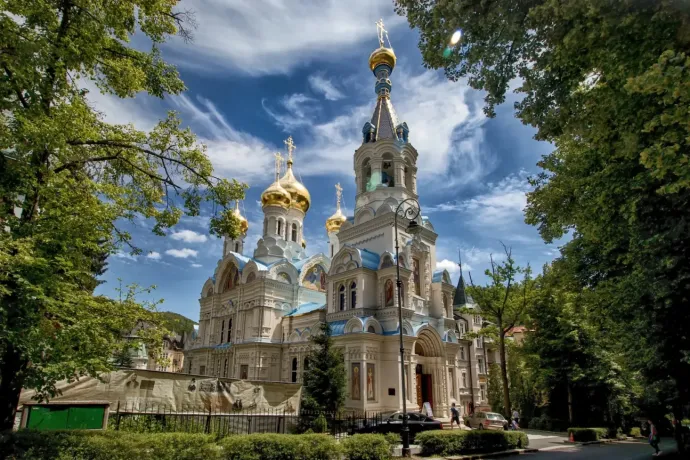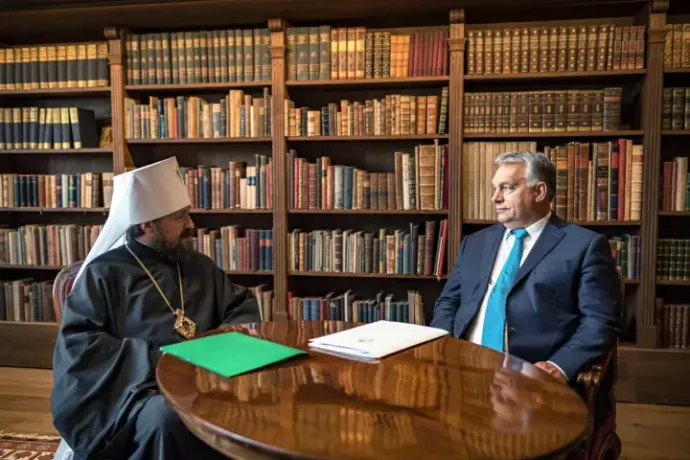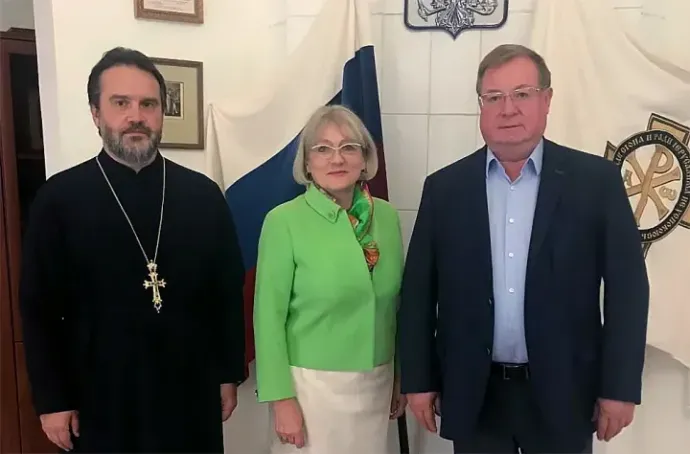Russian Orthodox Church properties in Czechia transferred to Hungarian diocese, likely due to fear of sanctions

The ownership of real estate belonging to the Russian Orthodox Church in Karlovy Vary, the Czech Republic, has been transferred to the Hungarian Orthodox Diocese, Czech investigative journalist Jiří Hynek has found.
One of the main sights of the spa resort town in the north-west of the Czech Republic is the golden-domed Russian-style Orthodox church. According to Hynek, not only did the ownership of the church pass to the Hungarian diocese earlier this year, but so did the parish and a valuable villa. According to the Czech press, the Russian Orthodox Church fears that in the future, its assets might be frozen in the Czech Republic, which is why they decided to transfer the ownership – as there is no reason to fear such a move in Hungary,
We sent questions to the office of the Hungarian Orthodox Diocese on the matter, but have not received a reply so far.
The fears of the Russian church leaders that the Czech authorities might target them is not unfounded. The Orthodox Church is known for openly supporting Putin. Two years ago, the Czech Republic placed Patriarch Kirill on its sanctions list. Born in the Soviet Union, Kirill found his way into both the Orthodox Church and the KGB early on, and became head of the church in 2009, by making use of his connections from before the regime change. Although the church leader used to speak about reconciliation and supported ecumenism, he has by now become a dominant figure of Russian imperialism, and the only reason the EU was unable to unanimously sanction him was because Viktor Orbán stood up for him and blocked the decision – citing religious freedom.
In spite of this, at the initiative of Foreign Minister Jan Lipavský, the Czechs were the first in the world to sanction Kirill, who was banned from entering the Czech Republic and from doing business there. When introducing the sanctions, Lipavský argued that Russian Orthodoxy fulfills more of a state role than a religious one. "It is not a church, and its leaders are not priests, but part of the Kremlin's repressive apparatus," Lipavský said. The example of the Czech Republic was followed by others, with Canada, Britain, Lithuania and Estonia also imposing sanctions against Kirill.
When the Czechs moved against him, they also froze his assets, but that measure only affected his private property. The church in Karlovy Vary, however, was not one of these, it belonged to the Czech diocese until it was recently transferred to the Hungarian diocese, as the press reports.
The question of course is how justified the Russians' fears about their assets being frozen are. According to Czech media reports, the government in Prague did indeed consider freezing the assets of the Kremlin-friendly church, and the financial analysis department responsible for implementing the sanctions did look into the matter, but ultimately chose not to intervene. The agency has not explained its decision to the public.
The transfer of the property rights to the Hungarian diocese is not the only reason why Karlovy Vary is of interest, but also because it is where the former Metropolitan of Budapest and Hungary, Hilarion, whose civil name is Grigory Alfeyev, is currently based.
Hilarion had been in charge of the foreign relations department of the Russian Orthodox Church since 2009, and as a kind of foreign minister of the organisation, he was considered Kirill's right-hand man. It was for this reason that he was regarded as a potential successor to Kirill. The war between Russia and Ukraine was already underway when he was transferred to Budapest in June 2022. Intelligence Online, a specialised publication covering the intelligence services, reported at the time that Hilarion was sent to Hungary because it was a place where he would be protected from European sanctions and from where he could manage his real estate and financial affairs without disturbance.
Even though Western intelligence experts believe that Hilarion works for the Russian secret service, both Prime Minister Viktor Orbán and his deputy, Zsolt Semjén were pleased to see him here, so much so that he was even granted Hungarian citizenship and a Hungarian passport. His passport was issued in September 2022, just three (!) months after arriving in Hungary. The Hungarian government has failed to explain why he was granted a passport and citizenship. During his time in Budapest, he met Semjén several times, and on one occasion he also held talks with Orbán.
Hilarion made the news in early July last year when Suzuki George, a 22-year-old from a Russian-Japanese family, alleged that the Metropolitan of Budapest had sexually abused him. Hilarion initially visited the young man to "check up" on him because he was ill, and when they returned to Hungary he started visiting him in the evenings and they would regularly sleep in the same bed. Suzuki however claims that there was no "direct sexual act". Hilarion was nevertheless caught up in the scandal: last December, it was decided in Moscow that he was to leave Budapest. After a short hiatus, the Russians sent him to the Czech Republic.

"The fact that Hilarion was sent back to a country within the Schengen zone – and one that is not far from Budapest – after just a brief time of rest, instead of being kept in Moscow, for example, suggests that he has a special task here that cannot be entrusted to anyone else. This is obviously not a purely ecclesiastical task, just as the Russian Orthodox Church is not just a church, but above all an organic part and instrument of Russian state power. This is evident from the Church's relationship with Russia's strategic nuclear forces or from its notoriously close relationship with Russian intelligence," former chief national security officer Péter Buda told Telex in a previous interview.
Hilarion went to Karlovy Vary after Nikolai Lischenyuk, who was until then the representative of the Russian Orthodox Church in the Czech Republic, was expelled by the Czech government on grounds of national security.
The spy nest
Lischenyuk served as a representative of the Karlovy Vary church from 2006 to 2022, and before that served at St George's Church of the Russian Embassy in the Czech Republic from 2001 to 2006. According to the Czech authorities, his residence permit was revoked on the basis of classified information pertaining to national security. According to the news portal denikn.cz, he was accused of "establishing a network of influence with the support of Russian state authorities that could threaten state security." Father Lischenyuk denied that he had cooperated with the Russian Federal Security Service (FSB).
The only reason given by the head of the Czech internal security service, Michal Koudelka for his expulsion was that he had carried out activities incompatible with the country's security. This suggests that, according to the Czech secret service, Lischenyk may have been carrying out secret service activities. Officially, he was accused of promoting separatist aspirations in the EU with the support of the Russian authorities. What this means exactly, however, was not disclosed.
The Czech Interior Minister's security expert Jan Padourek was more explicit when he said that the Karlovy Vary church was being used to cover up secret service activities. "The cooperation between the Russian Orthodox Church and the Russian secret services has been ongoing and proven since Soviet times," Padourek said, and the same was conveyed to Telex by former chief national security officer Péter Buda, who has long monitored the relationship between the Russian Orthodox Church and the Russian secret service.
The Czech press pointed out that the building of the parish in Karlovy Vary is sufficiently hidden to make it difficult to see who is visiting it. According to Czech security sources, Russian intelligence agents suspected of supporting separatists in other EU Member States, such as the Catalans, have also visited the parish.
However, Lischenyuk's lawyer, Michal Pacovský, denied that Russian intelligence agents had visited the parish, saying that the people who had come simply had cars with foreign plates. But this, he said, could not have posed a security risk to the Czech Republic. Previously, Lischenyuk was actively involved in the renovation of the church and was awarded an honorary citizens' title by the city – which was revoked in January.
Lischenyuk has sought legal redress. He challenged the revoking of his residence permit in court, but lost the lawsuits, and even the Constitutional Court did not rule in his favour.
A Moscow-based organisation with a Hungarian branch
According to Telex's research, Lischenyuk has been closely cooperating with a religious organisation based in Moscow and indirectly controlled by the Russian secret service and headed by Putin's former KGB colleague Sergey Stepashin, who maintains friendly relations with Putin. Stepashin actually led the FSB in the 1990s, and has also served as interior minister and even prime minister.

Stepashin, who regularly makes pro-war and anti-Ukrainian statements in the Russian press, is now the head of the Moscow-based Imperial Orthodox Palestine Society (IPPO), which also has a tentacle in Hungary, and whose members include the vice-president of (Fidesz's coalition partner, the Christian-Democrat) KDNP, the state secretary of French-Armenian descent Tristan Azbej and the former (Fidesz-member) mayor of Hévíz, Gábor Papp. Western intelligence services regard the IPPO as a front organisation for Russian intelligence.
After being expelled by the Czechs, Lischenyuk was transferred to the Moscow Patriarchate's Department for External Church Relations and given a medal by Stepashin. According to the Russian report on the award ceremony, even before receiving the award, Lischenyuk had been active in IPPO's international activities, working closely with Sergey Stepashin and Vice President Yelena Agapova, and had "played a prominent role" in the land and property-related affairs of the Russian Orthodox Church in the Czech Republic. By the way, it was also on the IPPO's website that we found the entry which attests to the fact that Stepashin and Lischenyuk met in the church in Karlovy Vary in 2018.
For more quick, accurate and impartial news from and about Hungary, subscribe to the Telex English newsletter!